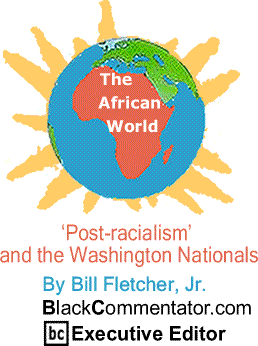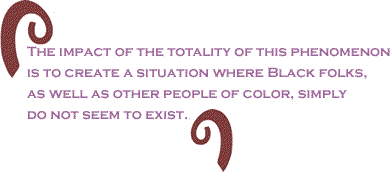
|
|||||||||||||||||||||||

|
|

Custom Search
|
|
 |
|
| It’s not just that the crowd is overwhelmingly white. Actually, I could live with that given the way that attendance at baseball has changed over the years, in part a reflection of the gentrification of US cities. What is striking is how race plays itself out in the stadium in this period where race is no longer supposed to matter. At a recent game of the Washington Nationals against the Atlanta Braves (which, by the way, the Nationals won, a remarkable occurrence given their recent record), what struck me was a comment by my wife: “Why,” she asked, “did the fans worship third baseman Ryan Zimmerman, yet react so differently to short stop Cristian Guzman?” She smiled after asking the rhetorical question. Guzman, at the time of the game (July 4th) had the best batting average on the Nationals, with a .333 entering the game compared with a .293 for Zimmerman. Yet, when Zimmerman’s name is announced, the crowd inevitably goes wild (and not just at the July 4th game). Zimmerman, who has been known for pulling a rabbit out of the hat in important games (and I actually like him) gets far more attention, even to the point of a semi-cult, compared with Guzman. Yes, the announcers love to introduce Guzman as “…Guuuz-man…” and Cristian has a wonderful soundtrack that accompanies his appearance, but it is simply not the same. When Guzman comes up to the plate, it is normally not treated as an event of significance. The problem does not end there. Inevitably the “fan of the day” event focuses on white people. For those unfamiliar with this, several fans are focused upon by the camera and then the crowd must cheer the loudest for whomever they believe should win the prize. Along with this, the cameras tend to focus on white fans generally. I have not kept track of who sings the National Anthem or Go Bless America, but it generally seems like it is white folks. The impact of the totality of this phenomenon is to create a situation where Black folks, as well as other people of color, simply do not seem to exist. In such a situation, the comfort level plummets. Yes, one does see African Americans and Latinos (not many Asians) at the game, but in very specific roles: certain players (though as has been noted, the percentage of African American players nationally dropped since the 1970s from around 26% to around 10%); sales (concession stands where one finds larger number of African Americans, at least at the Nationals game); and janitorial services (which is where one sees an overwhelmingly Latino workforce that waits patiently for the game to end before they enter the stadium, largely ignored by the departing fans).
The experience at the Nationals game is not exclusive to the Nationals. One can go to any number of Major League (and many Minor League) games across the USA and experience the same sensation. The game is not oriented, to any significant degree, towards us. This subtle exclusion is certainly different from the rabid hostility that many people of color experienced in earlier years where attending a game meant taking your life into your hands, e.g. attending Fenway Park in Boston to see the Red Sox in the 1970s and 1980s. This exclusion is more subtle and serves as an analogue to the notion of disparate discriminatory impact compared with intentional racist discrimination, a notion that the Supreme Court conservative majority seems to want to obliterate. Today’s Major League Baseball does not exclude those of us of color. We can play, in certain numbers. Fans can attend. And some stadiums will actually reduce the price of admission for many tickets in order to encourage broader attendance (which, by the way, is important give the overall price of tickets). Yet the bottom line, and one which you can feel as much as you can feel a fence, is that we are invisible; we are irrelevant to the sport-as-commercial industry. For
this situation to change, and change it must, there must be a challenge
to the system of baseball. Such a challenge will necessitate a different
role for the Major League Baseball Players Association (which is
the union representing the players); local governments; and community-based
organizations and institutions. Major League Baseball cannot be
given a pass when it comes to everything from outreach to daily
performance. The Player’s Association needs to speak up about the
reduction in African American players, but also the steps that need
to be taken in the USA to increase the numbers of young African
Americans entering the sport. If the Major League Baseball owners
I love baseball and I am a fan of both Zimmerman and Guzman. I am just tired of another part of US society where I am not simply taken for granted, but where my presence is treated as irrelevant. BlackCommentator.com
Executive Editor, Bill Fletcher, Jr., is a Senior Scholar with the
Institute for Policy Studies,
the immediate past president of TransAfrica Forum and co-author of, Solidarity Divided: The Crisis in Organized Labor and a New Path
toward Social Justice |
|
Any BlackCommentator.com article may be re-printed so long as it is re-printed in its entirety and full credit given to the author and www.BlackCommentator.com. If the re-print is on the Internet we additionally request a link back to the original piece on our Website. Your comments are always welcome. eMail re-print notice
If you send us an eMail message we may publish all or part of it, unless you tell us it is not for publication. You may also request that we withhold your name. Thank you very much for your readership. |
|
| |
|
| July
9, 2009 Issue 332 |
|
| Executive Editor: Bill Fletcher, Jr. |
| Managing Editor: Nancy Littlefield |
| Publisher: Peter Gamble |
| Est. April 5, 2002 |
Printer Friendly Version
in resizeable plain
text format or pdf
format. |
| Frequently Asked Questions |
 |

|
 |
 |
 |
| |
| |




































